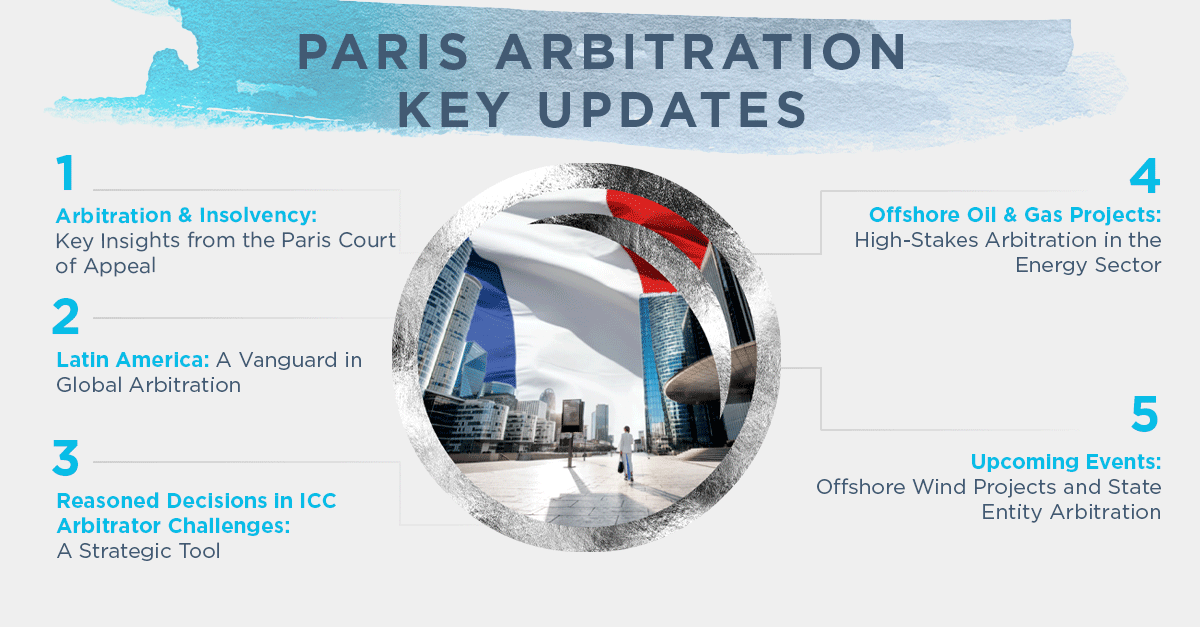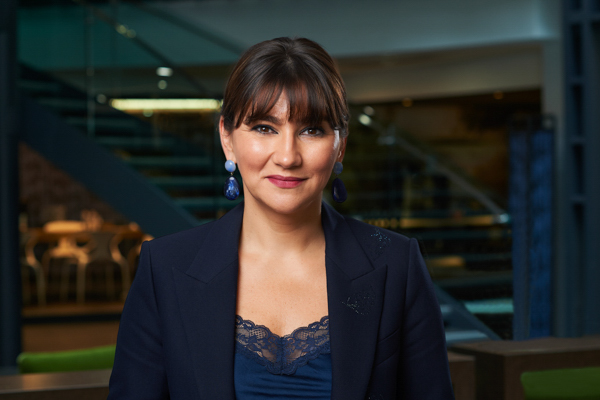Welcome to our latest update, focused on bringing you closer to the pulse of arbitration in Paris. In this edition we have curated key arbitration issues that we believe are important for you:
Enjoy the read! Please do get in touch if you have any feedback or questions.
Ioana

LATEST FRENCH ARBITRATION CASE LAW
ARBITRATION & INSOLVENCY: On 9 September 2025, the Paris Court of Appeal addressed whether enforcing an arbitral award against a party undergoing insolvency proceedings violates French international public policy, particularly the principle of equality among creditors.
This case arose from a dispute between Astaris, an Italian construction company in concordato preventivo (a form of Italian insolvency proceedings), and the Georgian Roads Department over a highway construction contract. Astaris sought to annul an ICC award, arguing that enforcement of the award would undermine the equality of creditors by allowing the Roads Department to receive preferential treatment, contrary to the concordato preventivo’s provisions. The Court rejected Astaris’ claim, holding that determining the payment modalities of the award under Italian insolvency law “did not fall within the arbitral tribunal’s mandate and pertained only to the enforcement measures related to the claim”. It concluded that the award did not violate French international public policy, as it did not compel enforcement contrary to the concordato preventivo.
Takeaway? This decision highlights that the modalities of payment of arbitral awards by companies undergoing insolvency proceedings have to respect the local applicable law and do not fall within the arbitral tribunal’s mandate.
(Read my analysis of the Court of Appeal’s decision here)
REGIONAL HIGHLIGHTS – Latin America: a vanguard in global arbitration
Latin America is steadily emerging as a pivotal region in the global arbitration landscape, driven by a wave of legislative reforms and judicial modernization over the past three decades. This particularly dynamic transformation demonstrates the region’s commitment to attracting foreign investment and offering efficient, impartial, and enforceable dispute resolution mechanisms – as illustrated by many recent key efforts:
- Modernization of arbitration frameworks: Several Latin American countries have recently implemented significant legislative changes to modernise their arbitration frameworks. In Brazil, amendments to Article 63 of the CPC added a new requirement for enforcing exclusive jurisdiction agreements. Similarly, Peru introduced a decree mandating the registration of arbitrators and arbitration centres to improve transparency and legal certainty, and the Ecuadorian Constitutional Court clarified that the Ecuadorian legal system does not mandate the recognition of a foreign award before its enforcement,
- Legislative reforms across the region: Building on the surge of FDI in the region, various states are seeking to attract large-scale investments. In July 2024, Argentina passed Law No. 27,742, establishing a new foreign investment regime with tax incentives and arbitration for disputes in sectors like energy, mining, and infrastructure. The following month, Costa Rica introduced its first green taxonomy to direct investors towards sustainable projects, with the aim to protect its rich but increasingly threatened biodiversity,
- Investment arbitration trends: Latin America continues to be a key area in the global arbitration landscape, with 31% of the ICSID’s registered cases in FY2024 originating from the region. Landmark cases such as Worley Parsons v Ecuador, in which the tribunal declined jurisdiction based on corruption allegations, and Glencore v Bolivia, where the tribunal addressed key issues including the clean hands doctrine and assessed the reasonability of state actions during social unrest, underscore the evolving jurisprudence and the region's impact on international investment law,
- Enforcement of arbitral awards: Courts across the region show a strong commitment to enforcing arbitral awards with minimal interference. In Mexico, Peru, Colombia, Argentina, and Brazil, specialised commercial or arbitration courts have expedited enforcement. In October 2024, Costa Rica adopted a new arbitration law based on the UNCITRAL Model Law, streamlining the enforcement of foreign arbitral awards, further illustrating the region’s efforts to align with international standards,
- ESG & ISDS: Latin America is seeing a rise in arbitrations involving environmental permits, green incentives, social licensing, and corruption. In areas like environmental protection, natural resources and energy supply, states increasingly invoke the “right to regulate,” arguing public interest measures do not breach treaty obligations – as was the case, in David Aven v Costa Rica (where an ICSID tribunal upheld Costa Rica’s environmental measures, finding no violation of FET or expropriation obligations) and in Red Eagle v Colombia (where the tribunal upheld Colombia’s environmental measures).
PRACTICAL TIPS – Reasoned decisions on arbitrator challenges in ICC arbitrations
Did you know that in ICC administered arbitrations, you can request the ICC Court to provide reasoned decisions for challenges to arbitrators? This option, introduced in 2015, offers greater transparency and accountability, and can be a valuable tool in your overall arbitration strategy. Here’s what you need to know:
- You must request the communication of reasons before the ICC Court renders its decision on the challenge. Note that the ICC Court may require an increase in administrative expenses for this service (typically capped at US$ 5,000),
- If you later are involved in an annulment procedure of the arbitral award, having a reasoned decision from the ICC Court may provide further arguments for your position.
So, if you are considering a challenge, think strategically about whether to request reasons. While it may involve additional cost, the benefits of understanding the ICC Court’s reasoning can outweigh the expense, particularly if enforcement or annulment proceedings are on the horizon! By the way, here is also a quick refresher of the rules for challenging arbitrators:
- Such challenge must be made in writing, specifying the facts and circumstances that you believe affect the arbitrator’s impartiality, independence, or ability to perform their duties,
- You must submit your challenge within 30 days of either (i) receiving notification of the arbitrator’s appointment or confirmation, or (ii) becoming aware of the facts and circumstances supporting your challenge (if later),
- The opposing party, the challenged arbitrator, and the other tribunal members must all be given an opportunity to comment in writing. The ICC Court will decide on both the admissibility and, if applicable, the merits of the challenge,
- If the ICC Court accepts the challenge, the arbitrator will be replaced (the Court also has the authority to replace an arbitrator on its own initiative if it determines the arbitrator is unable to perform their duties or is not acting in accordance with the rules). The ICC Court’s decision on a challenge is final and binding.
SECTORIAL NEWS – Latest arbitration case law in offshore oil and gas projects
The offshore sector increasingly relies on arbitration to solve very diverse disputes ranging from expropriation and contract breaches to regulatory challenges. Since we already explored in a previous edition of this newsletter the growing importance of arbitration in offshore wind projects, this month, we turn our focus to recent developments in offshore oil and gas projects, where arbitration remains a critical tool for managing disputes in this high-value and geopolitically sensitive industry:
- On 18 September 2025, ExxonMobil confirmed through its CEO that it had initiated a multibillion-dollar arbitration claim against Russia over the expropriation of its 30% stake in the Sakhalin-1 offshore oil project, following a 2022 decree transferring its interest to a domestic operator. The claim, filed under a production sharing contract, aims at recouping US$4.6 billion in expropriated assets and arises from one of the largest FDI in Russia (valued at up to US$12 billion),
- On 12 August 2025, ICSID registered an ECT arbitration claim filed by Cypriot-owned Buried Hill’s against Turkmenistan, over delays in developing the Serdar oil field in the Caspian Sea caused by a long-standing border dispute between Turkmenistan and Azerbaijan. The dispute stems from a 2007 production sharing agreement, with operations suspended until the two states reached a joint development agreement in 2021,
- On 1 August 2025, news surfaced that Canadian energy company Frontera Energy and its subsidiary CGX Energy are preparing to file an investment treaty claim against Guyana under the UK-Guyana BIT and Guyana’s Investment Act. The dispute arises from the government’s refusal to extend the exploration licence for the Corentyne offshore oil block, which Frontera claims has caused losses exceeding US$432 million,
- On 14 July 2025, Nigeria’s Federal High Court of Lagos authorised Dolphin Drilling, a Norwegian offshore drilling contractor, to commence collection proceedings to enforce a $105 million arbitration award against Lagos-based General Hydrocarbons Limited. The dispute arose from Dolphin’s termination of a drilling contract for the semi-submersible Blackford Dolphin oil rig off the coast of Nigeria, citing repeated delays in cash collections and contractual breaches,
- That same month, an ICC tribunal rejected ExxonMobil and China National Offshore Oil Corporation’s (CNOOC) claims that they had a right of first refusal over US-based Hess Corporation’s 30% stake in the Stabroek oil block, clearing the way for Chevron’s US$53 billion acquisition of Hess and bringing to a close one of the most high-profile commercial arbitrations in recent years. The Stabroek block is located offshore Guyana, which has emerged as the world’s fastest-growing oil region following major discoveries since 2015,
- On 2 June 2025, an ICSID annulment committee unanimously annulled a €190 million award in favour of UK-based Rockhopper Exploration. The award, issued in 2022, had found Italy liable for unlawful expropriation after it banned offshore drilling near its Adriatic coastline. The annulment was based on arbitrator Charles Poncet’s failure to disclose a decades-old criminal conviction, which the committee found undermined the tribunal’s proper constitution. The dispute has since been resubmitted to a new ICSID tribunal by Rockhopper, on 19 September 2025,
- On 6 May 2025, Chevron and Israel Natural Gas Lines (INGL) reached an in-principle settlement during mediation to resolve a dispute over fees under a transmission agreement for the Leviathan and Tamar offshore gas fields. Chevron had filed for arbitration in 2024, claiming INGL owed US$28.6 million due to construction delays and disruptions caused by the Gaza conflict.
BY THE WAY
October is packed with exciting arbitration events! On 3 October, I spoke at the VII CEA International Chapter Meeting in Rome, organised by the Club Español e Iberoamericano del Arbitraje (CEIA) with my great colleagues Ana Serra e Moura, Carmen Núñez Lagos, and Francesca Salerno under the excellent moderation of Heidi Lopez Castro. A fantastic opportunity to exchange insights on the no-less fascinating topic of “Arbitration with State Entities”!
Next up, I’ll be moderating a panel on “Offshore Wind Projects” at the ICC-FIDIC Conference on International Construction Contracts and Dispute Resolution on 14-15 October in Paris. We’ll dive into the nuts and bolts of contracts for fixed-bottom and floating offshore wind projects, like risk allocation and the need for a balanced standard contract, with an incredible line-up of speakers: Mahmoud Abu Hussein (FIDIC Contracts Committee), Jurriaan Kien (Legal Director New Energies at SBM Offshore), and Joanna Marciniak (Head of EPCI at Ocean Winds). If you’re attending, I’d love to see you there – and if not, let’s catch up for a coffee in Paris!


